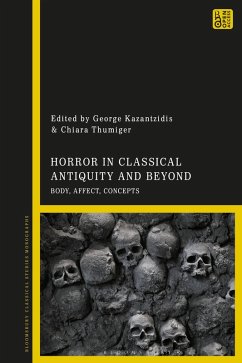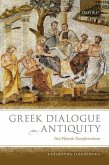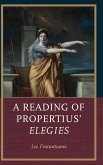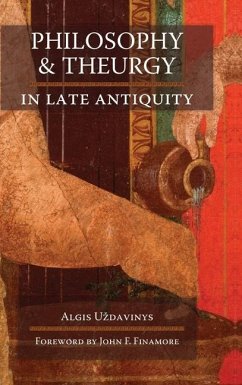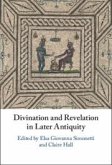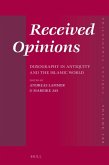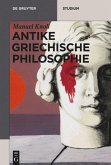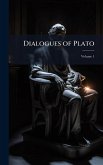Horror in Classical Antiquity and Beyond
Body, Affect, Concepts
Herausgeber: Thumiger, Chiara; Kazantzidis, George
Horror in Classical Antiquity and Beyond
Body, Affect, Concepts
Herausgeber: Thumiger, Chiara; Kazantzidis, George
- Gebundenes Buch
- Merkliste
- Auf die Merkliste
- Bewerten Bewerten
- Teilen
- Produkt teilen
- Produkterinnerung
- Produkterinnerung
A conceptual and cultural history of 'horror' as effect, concept, experience and emotion in Graeco-Roman antiquity and beyond.
Andere Kunden interessierten sich auch für
![Greek Dialogue in Antiquity Greek Dialogue in Antiquity]() Ja &Greek Dialogue in Antiquity113,99 €
Ja &Greek Dialogue in Antiquity113,99 €![Reading of Propertius' Elegies Reading of Propertius' Elegies]() Lee FratantuonoReading of Propertius' Elegies136,99 €
Lee FratantuonoReading of Propertius' Elegies136,99 €![Philosophy and Theurgy in Late Antiquity Philosophy and Theurgy in Late Antiquity]() Algis U'ZdavinysPhilosophy and Theurgy in Late Antiquity35,99 €
Algis U'ZdavinysPhilosophy and Theurgy in Late Antiquity35,99 €![Divination and Revelation in Later Antiquity Divination and Revelation in Later Antiquity]() Divination and Revelation in Later Antiquity98,99 €
Divination and Revelation in Later Antiquity98,99 €![Received Opinions Received Opinions]() Received Opinions145,99 €
Received Opinions145,99 €![Antike griechische Philosophie Antike griechische Philosophie]() Manuel KnollAntike griechische Philosophie34,95 €
Manuel KnollAntike griechische Philosophie34,95 €![Dialogues of Plato Dialogues of Plato]() Dialogues of Plato40,99 €
Dialogues of Plato40,99 €-
-
-
A conceptual and cultural history of 'horror' as effect, concept, experience and emotion in Graeco-Roman antiquity and beyond.
Produktdetails
- Produktdetails
- Verlag: Bloomsbury Academic
- Seitenzahl: 320
- Erscheinungstermin: 20. März 2025
- Englisch
- Abmessung: 236mm x 157mm x 25mm
- Gewicht: 748g
- ISBN-13: 9781350380646
- ISBN-10: 1350380644
- Artikelnr.: 72487787
- Herstellerkennzeichnung
- Libri GmbH
- Europaallee 1
- 36244 Bad Hersfeld
- gpsr@libri.de
- Verlag: Bloomsbury Academic
- Seitenzahl: 320
- Erscheinungstermin: 20. März 2025
- Englisch
- Abmessung: 236mm x 157mm x 25mm
- Gewicht: 748g
- ISBN-13: 9781350380646
- ISBN-10: 1350380644
- Artikelnr.: 72487787
- Herstellerkennzeichnung
- Libri GmbH
- Europaallee 1
- 36244 Bad Hersfeld
- gpsr@libri.de
George Kazantzidis is Associate Professor of Latin at the University of Patras, Greece. He is author of Lucretius on Disease: The Poetics of Morbidity in De rerum natura (2021), and co-editor of Body and Machine in Classical Antiquity (2023) and Medical Understandings of Emotions in Antiquity (2022). Chiara Thumiger is Research Fellow within the Cluster of Excellence Roots at Kiel University, Germany, and Guest Research Fellow at Humboldt University, Berlin. She is author of Phrenitis and the Pathology of the Mind in Western Medical Thought (2023), A History of the Mind and Mental Health in Classical Greek Medical Thought (2017) and Hidden Paths: Notions of Self, Tragic Characterization: Euripides' Bacchae (2007).
List of Illustrations
Acknowledgements
Introduction: Embodied Experience, Literary Representations and Human
Knowledge: Horror in Greco-Roman Antiquity and its Legacy
1. Horror Now and Horror Then: Horror's Long Reach from Antiquity to
Modernity and Back Again, Kathleen Noelle Cruz (University of
California-Davis, USA)
2. Horror in the Odyssey: A Few Notes on Leodes' Beheading (22.326-329),
Giulia Maria Chesi (University of Humboldt, Germany)
3. The Visceral Thrills of Tragedy: Flesh, Blood and Guts Off and On the
Tragic Stage, Evina Sistakou (Aristotle University, Greece)
4. The Horrific Body in Sophocles, Glenn Most (University of Chicago, USA)
5. Naming the Monster: Forensic Horror and Collective Trauma in Cicero's
Pro Roscio, Sophia Luise Häberle (University of Humboldt, Germany)
6. Fearful Laughter: Bodily Horror in Roman Sexual Humour, Jesse Weiner
(Hamilton College, USA)
7. Cruor in flores mutabitur: Horrific Hybridisations in the Metamorphoses
of Ovid, Aline Estèves (University of Montpellier, France)
8. Landscapes and Bodies of Horror in Seneca's Thyestes, Simona Martorana
(University of Kiel, Germany)
9. The Vocabulary of Homicidal Horror in Libanius' Against a Murderer,
Debbie Felton (University of Massachusetts Amherst, USA)
10. At the Borders of Horror and Science: The Social Contexts of Roman
Dissection, Claire Bubb (Institute for the Study of the Ancient World-New
York University, USA)
11. Overcoming Horror: 'Numbness' and Medical Agents. Some Thoughts on
Medical Horror in Antiquity and Today', Lutz Alexander Graumann
(Justus-Liebig-University Gießen-University Hospital, Germany)
12. Recipes for Horror in Greco-Roman Magic and Medicine, Sean Coughlin
(Institute of Philosophy-Czech Academy of Sciences, Czech Republic)
13. Horror, Writing and Dissection in Sheridan LeFanu's In a Glass Darkly,
Arden Hegele (Columbia University, USA)
Notes
Bibliography
Index rerum et nominum
Index Locorum
Acknowledgements
Introduction: Embodied Experience, Literary Representations and Human
Knowledge: Horror in Greco-Roman Antiquity and its Legacy
1. Horror Now and Horror Then: Horror's Long Reach from Antiquity to
Modernity and Back Again, Kathleen Noelle Cruz (University of
California-Davis, USA)
2. Horror in the Odyssey: A Few Notes on Leodes' Beheading (22.326-329),
Giulia Maria Chesi (University of Humboldt, Germany)
3. The Visceral Thrills of Tragedy: Flesh, Blood and Guts Off and On the
Tragic Stage, Evina Sistakou (Aristotle University, Greece)
4. The Horrific Body in Sophocles, Glenn Most (University of Chicago, USA)
5. Naming the Monster: Forensic Horror and Collective Trauma in Cicero's
Pro Roscio, Sophia Luise Häberle (University of Humboldt, Germany)
6. Fearful Laughter: Bodily Horror in Roman Sexual Humour, Jesse Weiner
(Hamilton College, USA)
7. Cruor in flores mutabitur: Horrific Hybridisations in the Metamorphoses
of Ovid, Aline Estèves (University of Montpellier, France)
8. Landscapes and Bodies of Horror in Seneca's Thyestes, Simona Martorana
(University of Kiel, Germany)
9. The Vocabulary of Homicidal Horror in Libanius' Against a Murderer,
Debbie Felton (University of Massachusetts Amherst, USA)
10. At the Borders of Horror and Science: The Social Contexts of Roman
Dissection, Claire Bubb (Institute for the Study of the Ancient World-New
York University, USA)
11. Overcoming Horror: 'Numbness' and Medical Agents. Some Thoughts on
Medical Horror in Antiquity and Today', Lutz Alexander Graumann
(Justus-Liebig-University Gießen-University Hospital, Germany)
12. Recipes for Horror in Greco-Roman Magic and Medicine, Sean Coughlin
(Institute of Philosophy-Czech Academy of Sciences, Czech Republic)
13. Horror, Writing and Dissection in Sheridan LeFanu's In a Glass Darkly,
Arden Hegele (Columbia University, USA)
Notes
Bibliography
Index rerum et nominum
Index Locorum
List of Illustrations
Acknowledgements
Introduction: Embodied Experience, Literary Representations and Human
Knowledge: Horror in Greco-Roman Antiquity and its Legacy
1. Horror Now and Horror Then: Horror's Long Reach from Antiquity to
Modernity and Back Again, Kathleen Noelle Cruz (University of
California-Davis, USA)
2. Horror in the Odyssey: A Few Notes on Leodes' Beheading (22.326-329),
Giulia Maria Chesi (University of Humboldt, Germany)
3. The Visceral Thrills of Tragedy: Flesh, Blood and Guts Off and On the
Tragic Stage, Evina Sistakou (Aristotle University, Greece)
4. The Horrific Body in Sophocles, Glenn Most (University of Chicago, USA)
5. Naming the Monster: Forensic Horror and Collective Trauma in Cicero's
Pro Roscio, Sophia Luise Häberle (University of Humboldt, Germany)
6. Fearful Laughter: Bodily Horror in Roman Sexual Humour, Jesse Weiner
(Hamilton College, USA)
7. Cruor in flores mutabitur: Horrific Hybridisations in the Metamorphoses
of Ovid, Aline Estèves (University of Montpellier, France)
8. Landscapes and Bodies of Horror in Seneca's Thyestes, Simona Martorana
(University of Kiel, Germany)
9. The Vocabulary of Homicidal Horror in Libanius' Against a Murderer,
Debbie Felton (University of Massachusetts Amherst, USA)
10. At the Borders of Horror and Science: The Social Contexts of Roman
Dissection, Claire Bubb (Institute for the Study of the Ancient World-New
York University, USA)
11. Overcoming Horror: 'Numbness' and Medical Agents. Some Thoughts on
Medical Horror in Antiquity and Today', Lutz Alexander Graumann
(Justus-Liebig-University Gießen-University Hospital, Germany)
12. Recipes for Horror in Greco-Roman Magic and Medicine, Sean Coughlin
(Institute of Philosophy-Czech Academy of Sciences, Czech Republic)
13. Horror, Writing and Dissection in Sheridan LeFanu's In a Glass Darkly,
Arden Hegele (Columbia University, USA)
Notes
Bibliography
Index rerum et nominum
Index Locorum
Acknowledgements
Introduction: Embodied Experience, Literary Representations and Human
Knowledge: Horror in Greco-Roman Antiquity and its Legacy
1. Horror Now and Horror Then: Horror's Long Reach from Antiquity to
Modernity and Back Again, Kathleen Noelle Cruz (University of
California-Davis, USA)
2. Horror in the Odyssey: A Few Notes on Leodes' Beheading (22.326-329),
Giulia Maria Chesi (University of Humboldt, Germany)
3. The Visceral Thrills of Tragedy: Flesh, Blood and Guts Off and On the
Tragic Stage, Evina Sistakou (Aristotle University, Greece)
4. The Horrific Body in Sophocles, Glenn Most (University of Chicago, USA)
5. Naming the Monster: Forensic Horror and Collective Trauma in Cicero's
Pro Roscio, Sophia Luise Häberle (University of Humboldt, Germany)
6. Fearful Laughter: Bodily Horror in Roman Sexual Humour, Jesse Weiner
(Hamilton College, USA)
7. Cruor in flores mutabitur: Horrific Hybridisations in the Metamorphoses
of Ovid, Aline Estèves (University of Montpellier, France)
8. Landscapes and Bodies of Horror in Seneca's Thyestes, Simona Martorana
(University of Kiel, Germany)
9. The Vocabulary of Homicidal Horror in Libanius' Against a Murderer,
Debbie Felton (University of Massachusetts Amherst, USA)
10. At the Borders of Horror and Science: The Social Contexts of Roman
Dissection, Claire Bubb (Institute for the Study of the Ancient World-New
York University, USA)
11. Overcoming Horror: 'Numbness' and Medical Agents. Some Thoughts on
Medical Horror in Antiquity and Today', Lutz Alexander Graumann
(Justus-Liebig-University Gießen-University Hospital, Germany)
12. Recipes for Horror in Greco-Roman Magic and Medicine, Sean Coughlin
(Institute of Philosophy-Czech Academy of Sciences, Czech Republic)
13. Horror, Writing and Dissection in Sheridan LeFanu's In a Glass Darkly,
Arden Hegele (Columbia University, USA)
Notes
Bibliography
Index rerum et nominum
Index Locorum

